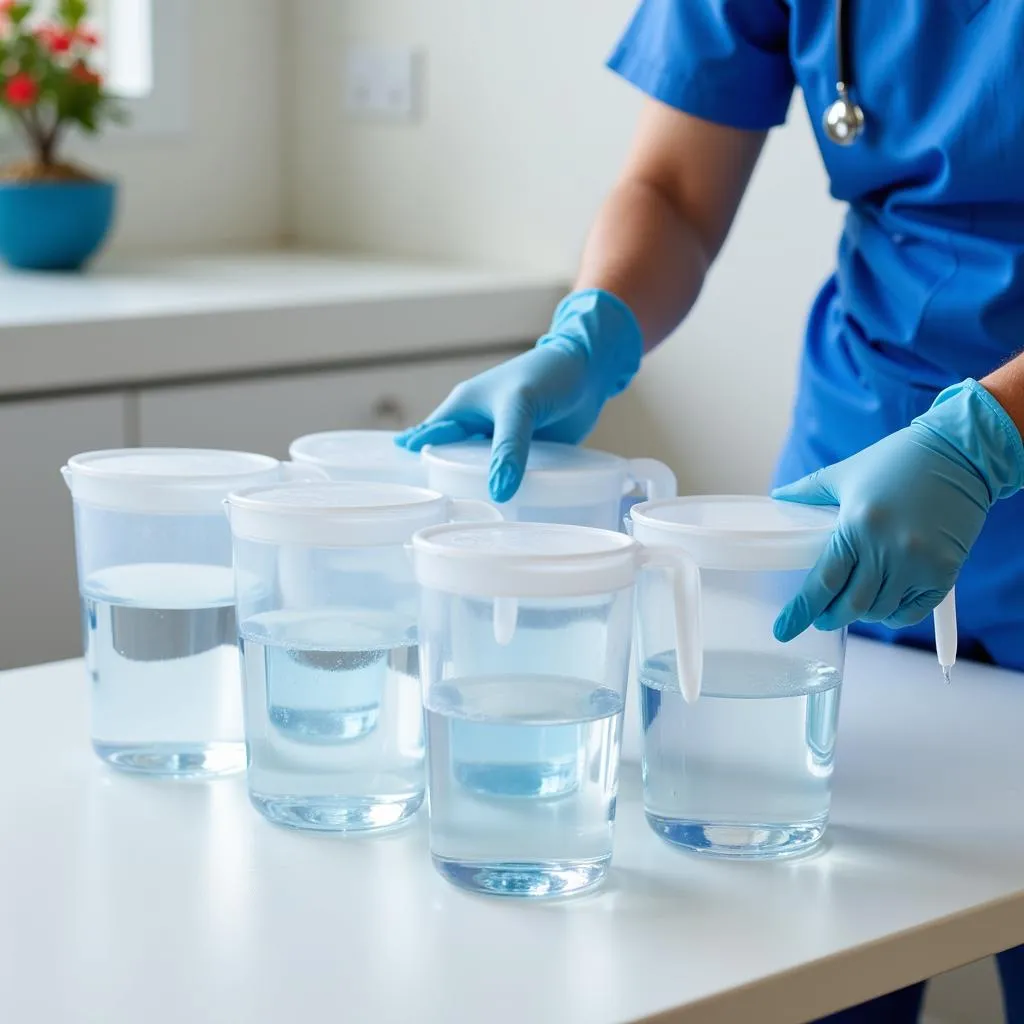Hospital Water Pitchers are an essential part of patient care, ensuring hydration and comfort throughout their stay. But with so many options available, choosing the right pitcher for your facility can feel overwhelming. This guide will explore the key factors to consider when selecting hospital water pitchers, ensuring you provide the best possible experience for your patients.
Understanding the Importance of Proper Hydration in Healthcare
Before delving into the specifics of hospital water pitchers, it’s crucial to understand why proper hydration is so vital in a healthcare setting. Dehydration can lead to a range of complications, especially for patients already facing health challenges. It can delay recovery, increase the risk of urinary tract infections, and even impact cognitive function.
Providing patients with easy access to fresh, clean water is fundamental to their well-being. This is where choosing the right hospital water pitcher plays a crucial role.
 Hospital patient drinking water from a pitcher
Hospital patient drinking water from a pitcher
Key Factors to Consider When Choosing Hospital Water Pitchers
Selecting the appropriate water pitchers for a hospital requires careful consideration of various factors. Here’s a breakdown of the key aspects to keep in mind:
1. Material and Durability
Hospital water pitchers are subjected to frequent use and sanitation procedures. Therefore, durability is paramount. Common materials include:
- Plastic: Lightweight, shatterproof, and cost-effective, plastic pitchers are a popular choice. Look for BPA-free options for patient safety.
- Stainless Steel: Known for their durability and resistance to stains and odors, stainless steel pitchers offer a more robust option, though they come at a higher price point.
- Glass: While offering a classic aesthetic, glass pitchers are less common in hospitals due to their breakability.
The choice of material often depends on the hospital’s budget and specific needs.
2. Capacity and Size
Consider the typical water intake needs of your patients and the frequency of refills when deciding on pitcher capacity. Larger pitchers may be suitable for patients requiring higher fluid intake, while smaller pitchers are ideal for bedside use and ease of handling by patients with limited mobility.
3. Ease of Cleaning and Sanitation
Infection control is critical in healthcare settings. Choose pitchers that are easy to clean and sanitize thoroughly. Look for dishwasher-safe options and those with smooth, easily accessible interiors to prevent bacterial growth.
 Hospital staff member sanitizing water pitchers
Hospital staff member sanitizing water pitchers
4. Features for Patient Comfort
Consider features that enhance patient comfort and independence. These might include:
- Ergonomic Handles: Pitchers with comfortable, easy-to-grip handles are essential, especially for patients with dexterity issues.
- Spill-Proof Lids: Lids with secure closures prevent spills and maintain water hygiene.
- Measurement Markings: Graduated markings on the pitcher allow for accurate monitoring of water intake, which can be crucial for certain patients.
5. Cost and Value
Hospital water pitchers come in a wide range of prices. While cost is a factor, focus on the overall value and long-term durability. Investing in high-quality pitchers that can withstand frequent use and cleaning can save money in the long run.
FAQs about Hospital Water Pitchers
What types of lids are most hygienic for hospital water pitchers?
Lids that are easy to remove, clean, and sanitize thoroughly are crucial for hygiene. Look for options with smooth surfaces and minimal crevices where bacteria can hide.
Are disposable water pitchers a good option for hospitals?
While disposable pitchers eliminate the need for washing, they generate significant waste and are not environmentally friendly. Reusable pitchers with proper sanitation practices are a more sustainable choice.
What is the standard size for hospital water pitchers?
The standard size typically holds around 64 ounces, but smaller and larger options are available to suit different needs.
Conclusion
Choosing the right hospital water pitchers is essential for promoting patient hydration, comfort, and well-being. By carefully considering factors such as material, durability, ease of cleaning, and patient-friendly features, you can make informed decisions that prioritize the health and satisfaction of those in your care. Remember, even seemingly small details like water pitchers contribute to a positive and healing environment.
If you need assistance choosing the best hospital water pitchers for your facility, contact us at Phone Number: 02437655121, Email: [email protected] Or visit us at: No. 298 Cau Dien Street, Minh Khai, Bac Tu Liem, Hanoi, Vietnam. Our dedicated customer support team is available 24/7 to assist you.